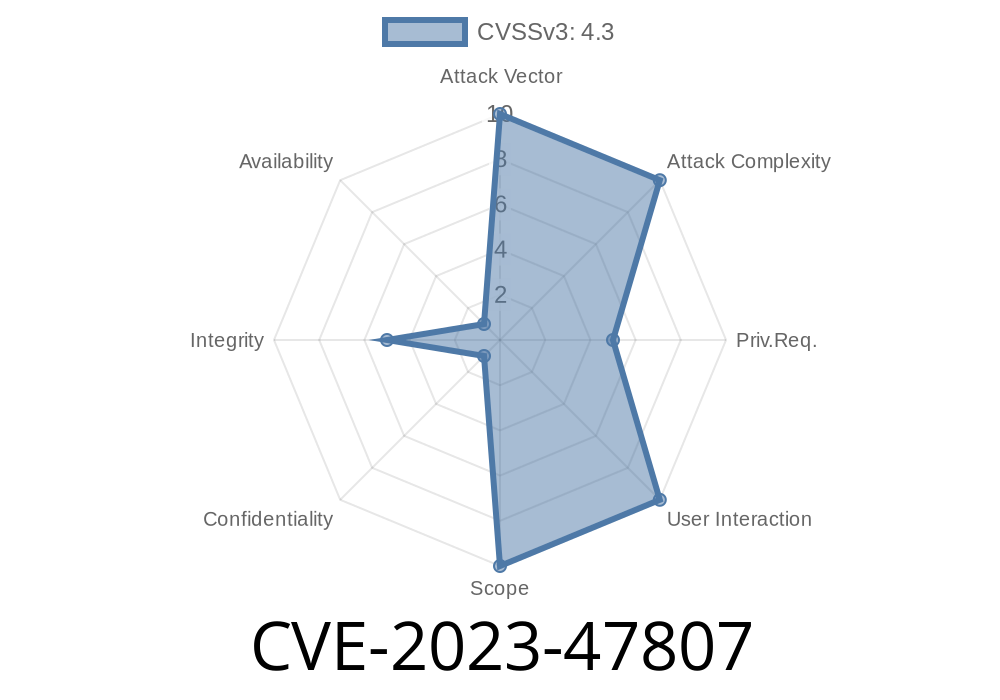In late 2023, a security vulnerability known as CVE-2023-47807 was discovered in the popular WordPress plugin, 10WebAnalytics. This bug, caused by missing authorization checks, affects all plugin versions up to and including 1.2.12. Because of incorrectly configured access control security levels, attackers can access certain sensitive plugin actions without being properly authenticated. This long read explains in detail what the vulnerability is, how it can be exploited, and how you can protect your website.
What is 10WebAnalytics?
10WebAnalytics is a WordPress plugin that provides Google Analytics integration and reporting right inside the WordPress dashboard. It’s used by thousands of websites to monitor traffic and user behavior.
But—in versions up to 1.2.12, a missing authorization check means more than just the site admins can access sensitive plugin functionality.
The Vulnerability
CVE-2023-47807 is a case of missing authorization. This means the plugin fails to check if a user is permitted to perform certain actions. As a result, even non-logged-in users (or logged-in users without required privileges) can access sensitive endpoints. This violates the fundamental principle of least privilege in security.
Technical Details & Exploit
Let's break down the vulnerability with a simplified example and real endpoint.
Suppose the following code is found inside admin.php or similar core files
// This API action handler does NOT enforce authorization
function tw_analytics_export_data() {
// No check: current_user_can('manage_options')
$data = get_option('tw_analytics_data');
echo json_encode($data);
exit;
}
add_action('wp_ajax_tw_analytics_export', 'tw_analytics_export_data');
// ... but no check if user is logged in or has correct role!
Normally, WordPress actions like wp_ajax_... should be secured with capability checks
function tw_analytics_export_data() {
if ( ! current_user_can('manage_options') ) {
wp_die('Unauthorized', 403);
}
// Safe to proceed
$data = get_option('tw_analytics_data');
echo json_encode($data);
exit;
}
But in affected versions, some critical actions are not protected in this way.
You can find the action by inspecting the plugin's admin-ajax.php requests or reading the code
/wp-admin/admin-ajax.php?action=tw_analytics_export
You don't need to be logged in! You can do this with curl or in the browser
curl -X GET "https://targetsite.com/wp-admin/admin-ajax.php?action=tw_analytics_export";
Step 3: Retrieve Sensitive Data
If vulnerable, this request returns exported analytics data or other privileged information that should only be accessible to admins.
Data Disclosure: Attackers can read sensitive analytics or configuration data.
- Privilege Escalation: If other insecure actions exist, they could possibly change site settings or inject data.
- Reconnaissance: Even knowing data structure or analytics info can help attackers in further attacks.
References
- CVE-2023-47807 at NIST NVD
- 10WebAnalytics Plugin Page
- Patchstack Database Entry
How to Fix
Update immediately to the latest version of 10WebAnalytics. The vendor has reportedly patched this in a newer (after 1.2.12) release. You can update from your WordPress dashboard or download a new copy from WordPress.org.
Summary
CVE-2023-47807 is a classic but dangerous error: missing authorization in a WordPress plugin. Anyone can trigger privileged actions just by hitting the right endpoints—no login needed. If you use 10WebAnalytics, update ASAP. Even if you don’t, this bug highlights a frequent weakness in many WordPress plugins, so always keep your plugins patched and watch for missing capability checks.
Timeline
Published on: 01/02/2025 15:15:20 UTC
